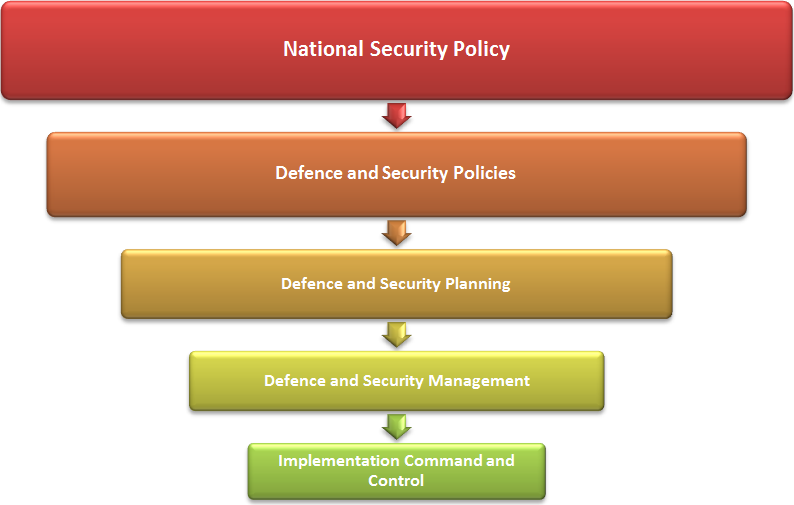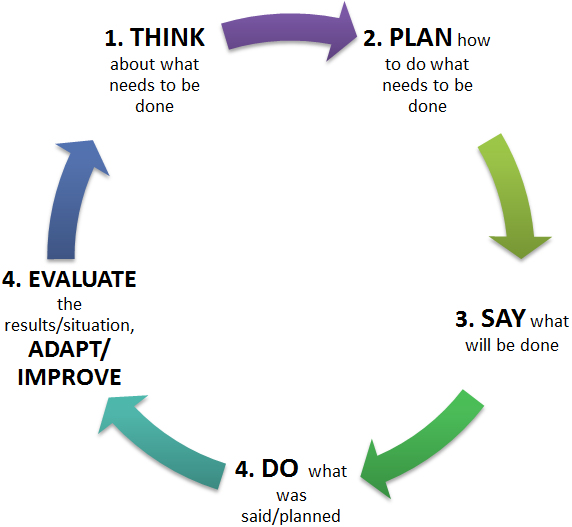National security policy, also known as national security doctrine, is a framework describing how a country provides security for the state and its citizens. National security prolicy is a formal description of a country’s understanding of its guiding principles, values, interests, goals, strategic environment, threats, risks, and challenges in view of protecting and promoting national security. Typically, national security policy is based on a country’s constitution, founding documents, and legislation. The policy clarifies behaviours and responsibilities of state institutions in providing security and upholding the rule of law.[1]
What is National Security Policy?
According to the United Nations SSR Task Force, National Security Policy (NSP) provides guidelines for a country to address security needs of the people and the state. The policy incorporates the views of the Government and other institutions, as well as needs and perceptions of the people and takes the form of a National Security Policy document. Some countries do not have a single national security policy document but a series of policy documents, such as White Papers on Defence, speeches of the authorities, and other related papers. National security policy should incorporate, or give place to, the development of National Security and Defence Strategies. Latter identifies the formal methods that will be used to attain security and defence objectives described by National Security Policy.[2]
Why is it important?
As stated by United Nations SSR task Force, National security policies addressing both effectiveness and accountability are essential for the legitimacy of security institutions and the protection of citizens and their rights. National security policies are closely linked to Security Sector Reform (SSR); they represent strategic entry-points for engaging in and guiding SSR efforts.[3] As National Security Policies are based on core national legal documents, the development of NSPs also provides an opportunity to review and improve that legal framework.
How does it work?
National Security Policy documents are country- specific. However, some common traits when it comes to general content can be outlined. NSPs tend to address at least three basic themes:
1) The state’s role in the international system
2) Perceived international challenges and opportunities;
3) The responsibilities of implementing actors in addressing these challenges and opportunities.
The first element defines the state’s vision of the international system and the role that the state plays in that system. The second element assesses current and future threats and opportunities (both internal and external). The third element describes the functions and responsibilities of each implementing actor.[4]
In general, NSP documents do not provide specific solutions to security threats or problems. These are to be addressed in later strategic documents and management phases: Security and Defence Planning, Programming, and Implementation
In the framework of Building Integrity and Good Governance in Defence and Security Sector, the following principles for an effective and democratic NSP should be observed in its development process:
- A holistic approach to security concerns, actors, and means is the best way to cover the largest array of security and defence issues.
- Debate and consensus are essential for a legitimate and effective NSP.
- A wide range of threats should be considered, including social and economic threats, natural disasters, terrorism, etc.
- A careful assessment of current available means is needed.
- Transparency, monitoring and accountability of processes and actors are essential.
- Flexibility and preparedness are crucial in an ever changing security environment.
- NSP must take the international environment, actors, standards and regulations into consideration.
- International law must be respected.
Who is involved?
A comprehensive NSP development process should encompass a wide array of actors. Although the drafting and approval stages occur at the highest authority levels, assessment, research, and formulation phases must involve expertise and input from all concerned and interested parties. From civil society organisations, academics who perform an oversight role, and security sector personnel at every level who implement and experience first-hand the dictates and effects of NSP, up to the Government, ministries, and the Parliament, who’s role in overseeing the entire process is of crucial importance.
Resources
Centre for Integrity in the Defence Sector. Criteria for good governance in the defence sector. International standards and principles (2015)
Centre for Integrity in the Defence Sector: Guides to Good Governance
Centre for Integrity in the Defence Sector. Integrity Action Plan. A handbook for practitioners in defence establishments (2014)
DCAF (2008), National Security Policy Backgrounder. New edition available here.
DCAF (2009), Defence Reform. Backgrounder. New edition available here.
DCAF (2009), Police Reform. Backgrounder. New edition available here.
DCAF (2009), Security Sector Governance and Reform Backgrounder. New edition available here.
DCAF (2009), Security Sector Reform and Intergovernmental Organisations. Backgrounder. New edition available here.
DCAF (2015), Parliamentary Brief: Building integrity in Defence.
DCAF – UNDP (2008) Public Oversight of the Security Sector. A Handbook for civil society organizations.
Hari Bucur-Marcu, Philipp Fluri, Todor Tagarev (eds.) Defence Management: An Introduction. Security and Defence Management Series No1. DCAF (2009)
NATO-DCAF, (2010). Building Integrity and Reducing Corruption in Defence. A Compendium of Best Practices.
NATO (2012) Building Integrity Programme
OSCE Code of Conduct on Politico- Military Aspects of Security
Transparency International (2012). Building Integrity and Countering Corruption In Defence and Security. 20 Practical Reforms.
United Nations SSR task force, Security Sector Reform Integrated Technical Guidance Notes. 2012.
[1] Sources: UN SSR Task Force (2012), Security Sector Reform. Integrated Technical Guidance Notes; DCAF (2008), National Security Policy Backgrounder. New edition here.
[2] United Nations SSR task force, Security Sector Reform Integrated Technical Guidance Notes. 2012. p 122-125.
[3] Ibid. p 121.
[4] DCAF (2008), National Security Policy Backgrounder. New edition available here.





